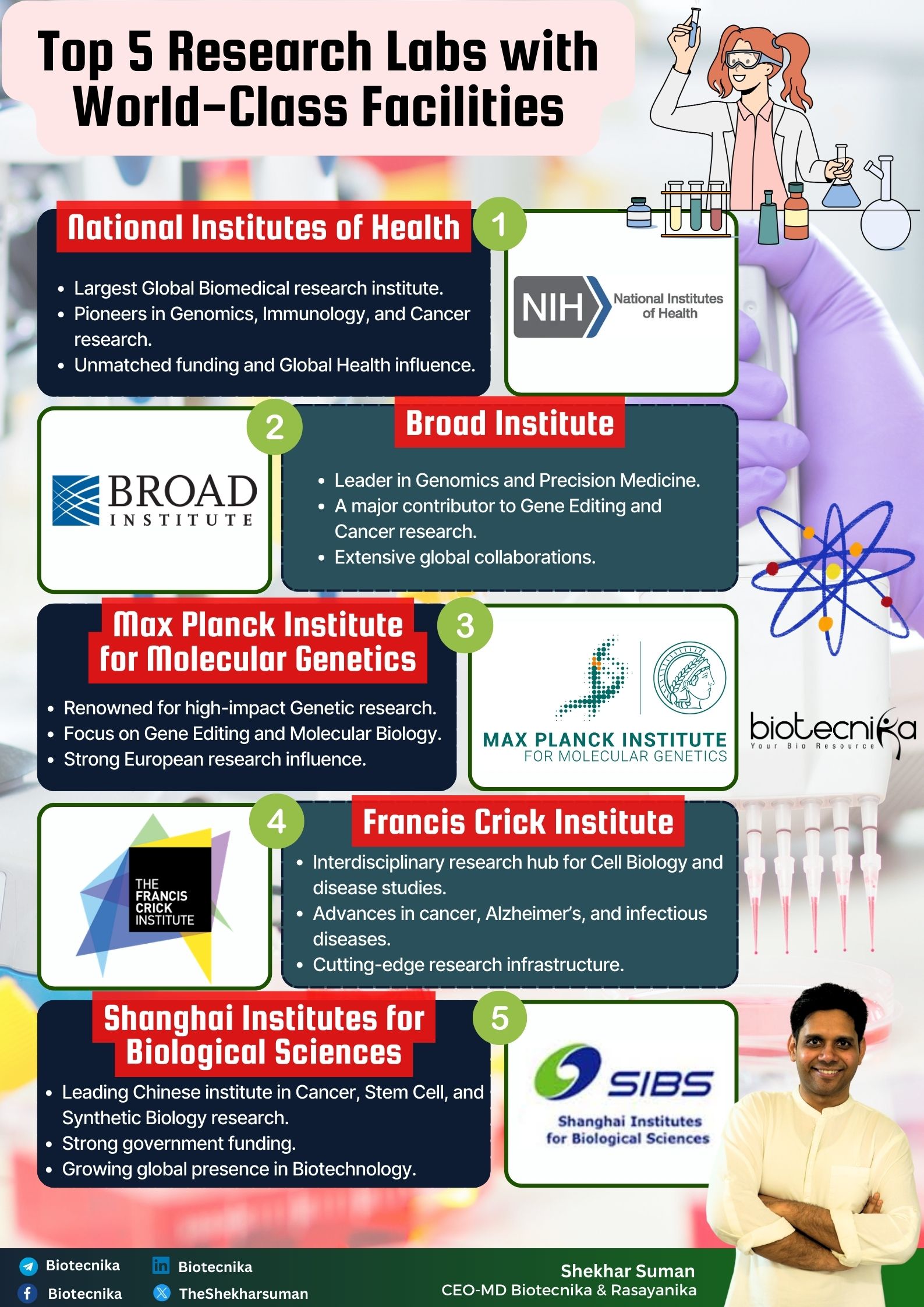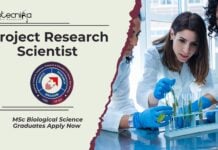Top 5 Research Labs in Life Science
Alisha is a researcher at the Francis Crick Institute, a prestigious Research institute. She stares at brain cells under a microscope, thinking of her grandmother, who lost all her memories to Alzheimer’s disease. Motivated by this personal loss, Alisha decided to dedicate her life to understanding and finding solutions for this disorder. After years of research, he and her team identified a protein pathway that slows down memory loss. A breakthrough that could offer hope to millions of families.
Scientific research is the driving force behind medical and technological advancements that shape our world. Across the globe, several laboratories stand out as global powerhouses of innovation, pushing the boundaries of Science and Biotechnology with groundbreaking research and futuristic technologies.
This article explores 5 leading Research laboratories in the world, featuring their uniqueness, key research areas, as well as how you can join these prestigious institutions.
Whether you are a budding Researcher or just curious about how these laboratories shape the future, this guide has you covered.
- Max Planck Institute for Molecular Genetics (Germany)
The Max Planck Institute for Molecular Genetics, situated in Berlin (Germany), is a global leader in Molecular Biology and Genome Research. It is known for its contributions to the famous “Human Genome Project”. Max Planck Institute for Molecular Genetics specializes in understanding and decoding the blueprint of life, i.e., DNA (Deoxy Ribonucleic Acid), as well as unraveling the molecular mechanisms underlying genetic disease and regulations. They majorly specialize in functional genomics and epigenetics research.
It is equipped with high-throughput sequencing technologies, advanced imaging platforms, and automated genome analysis systems, making it one of the world’s most advanced and sophisticated Genetics Research Institutes. Its futuristic Bioinformatics tools and technology aid Researchers in processing vast Genetic datasets, leading to personalized medications and epigenetics.
Key Areas of Research
- Genome sequencing – Identifying genetic markers for diseases and Decoding DNA.
- Epigenetics – Understanding the genes regulation as well as their impact on disorders and diseases, including diabetes and cancer.
- Developmental Biology – Investigating and analyzing Genetic patterns that control evolution and growth.
- Molecular Medicine – Developing therapies based on Genetic insights.
How to Join
- PhD Programs: Fully-funded doctoral programs through the International Max Planck Research Schools (IMPRS).
- Internships: Summer and winter internship opportunities for undergraduates and postgraduates.
- Postdoctoral Fellowships: Available for international researchers with Genetics, Molecular Biology, or Bioinformatic expertise.
2. Broad Institute (USA)
The Broad Institute, situated in Cambridge (Massachusetts), is at the forefront of data-driven Biology and Genomics. The Broad Institute on integrating Artificial Intelligence as well as Computational Biology, the Broad Institute is transforming biomedical research through advanced analytics and machine learning technologies.
The laboratories at The Broad Institute contributed significantly to the Noble prize-winning technique ‘CRISPR cas9 with applications in human health and diseases. It allows Scientists and researchers to modify DNA precisely. Its innovative approaches to single-cell sequencing and Cancer Genomics provide deep insights into potential therapies and disease progression.
The institute is also known for its innovations in identifying Genetic Markers and Psychiatric Genomics linked to diseases and disorders, including Bipolar disorder and Schizophrenia. Researchers at the Broad Institute’s work on Targeted and Personalized therapies and Drug Discovery has redefined cancer and other complicated disease treatments.
Key Areas of Research
- Cancer Genomics – Mapping genetic mutations in tumors to develop Personalized Therapeutics.
- Neurogenomics – Uncovering Genetic links to Neurological and Psychiatric disorders.
- Drug Discovery – Identifying new therapeutic targets using data-driven methods.
- Machine Learning in Biology – Using AI (Artificial Intelligence) and ML (Machne Learning) to model biological processes and predict results.
How to Join
- Internships: The Broad Summer Research Program (BSRPs) for undergraduates.
- Fellowships: Postdoctoral fellowships in Genomics, AI & ML applications in Biology, as well as Bioinformatics.
- Graduate Programs: The Broad Institute collaborates with Harvard, Massachusetts Institute of Technology (MIT), and other leading institutes and universities and offers a wide range of graduate programs.
Top 5 Research Labs in Life Science

3. Francis Crick Institute (United Kingdom)
The Francis Crick Institute, situated in London, is at the forefront of Biomedical Research. Here, Scientists and researchers focus on interdisciplinary research and translating basic science into clinical innovations. The institute fosters collaboration with other Universities or institutes and encourages Researchers from various fields to share ideas, develop therapies, and contribute to the world.
The institute excels in translational Science, turning laboratory inventions into Clinical applications. Its research covers Cancer Biology, Neurodegenerative Diseases, disorders, and Immune System Therapies.
The Fracis Crick Institute has pioneered breakthroughs in Immunotherapy, utilizing the immune system to fight cancer as well as Stem Cell Research, Opening new horizons to Regenerative Medicine.
Key Areas of Research
- Cancer Biology – Understanding tumor development as well as testing innovative treatments.
- Neurobiology – Exploring brain function and Neurodegenerative Disorders such as Parkinson’s and Alzheimer’s.
- Immunology – Studying immune responses to design vaccines and therapies.
- Stem Cell Research – Research focused on Tissue Engineering and Regenerative Medicine.
How to Join
- PhD Programs: Fully-funded doctoral programs in partnership with University College London and the Imperial College (London).
- Internships: Research training programs for undergraduates and graduates.
- Postdoc Fellowships: Opportunities for researchers specializing in Molecular Biology and Biomedical Science.
4. National Institutes of Health (USA)
The National Institutes of Health (NIH), situated in Maryland (The United States of America), is the world’s largest hub for Biomedical Research. NIH has 27 specialized institutes, leading to innovations in almost every area of Health and Medicine. The NIH’s Clinical Center focuses on experimental treatments, bridging the gap between patient care as well as laboratory discoveries. The NIH was instrumental in developing mRNA vaccines, HIV-AIDS (Acquired Immuno Deficiency Syndrome) therapies, and treatments for rare genetic disorders.
Key Areas of Research
- Cancer therapies – Immunotherapy, Gene Editing, and Precision Medications.
- Infectious diseases – Vaccines for deadly diseases such as HIV-AIDS (Acquired Immuno Deficiency Syndrome), COVID-19, as well as malaria.
- Mental health research – Studying Depression, Anxiety, as well as Schizophrenia.
- Genomics and rare diseases – Understanding inherited disorders for tailored treatments.
How to Join
- Internships: Programs for undergraduates and graduates through the Summer Internship Program (SIP).
- Postdoctoral Fellowships: Available through the Intramural Research Program (IRP).
- Graduate Programs: NIH collaborates with leading Institutes like Oxford University and Johns Hopkins University for graduate programs.
- Shanghai Institutes for Biological Sciences (China)
The Shanghai Institutes for Biological Sciences (SIBS), situated in Shanghai (China), stands out for its interdisciplinary approach, combining modern genomics with insights from traditional Chinese medicine. SIBS leads Biotechnology, Ecology, and Agricultural Biology research in China’s innovation hub.
The laboratory is renowned for its work on Genetic Modification of crops, pharmacology, and environmental Biology, tackling global issues like food security and Sustainable Agriculture.
Key Areas of Research
- Genomics and Molecular Biology – Understanding proteins and genes in diseases and disorders.
- Agricultural Biotechnology – Improving crop disease resistance and crop yields.
- Ecological research – Studying Environmental Health and Sustainability.
- Pharmacology – Developing therapies inspired by traditional medicine.
How to Join
- Graduate Programs: Master’s and Doctoral programs in collaboration with leading Chinese universities and Institutes.
- Postdoctoral Fellowships: PhD fellowships for Scholars in Molecular Biology, Bioinformatics, and Pharmacology.
- Internships: Internship programs for international students and freshers.
These world-class Research Laboratories are not just research spaces but epicenters of discovery and advancement. They significantly impact fields such as Healthcare, Biotechnology, and Agriculture, shaping policies and improving lives globally. For aspiring researchers, they offer unmatched opportunities to contribute to transformative science.
Ready to explore the frontiers of knowledge? Choose a laboratory, prepare well, and take your first step into a world of innovation!
Top 5 Research Labs in Life Science










































I have liked the programs you offer to international students, am looking for PhD scholarship in Biotechnology